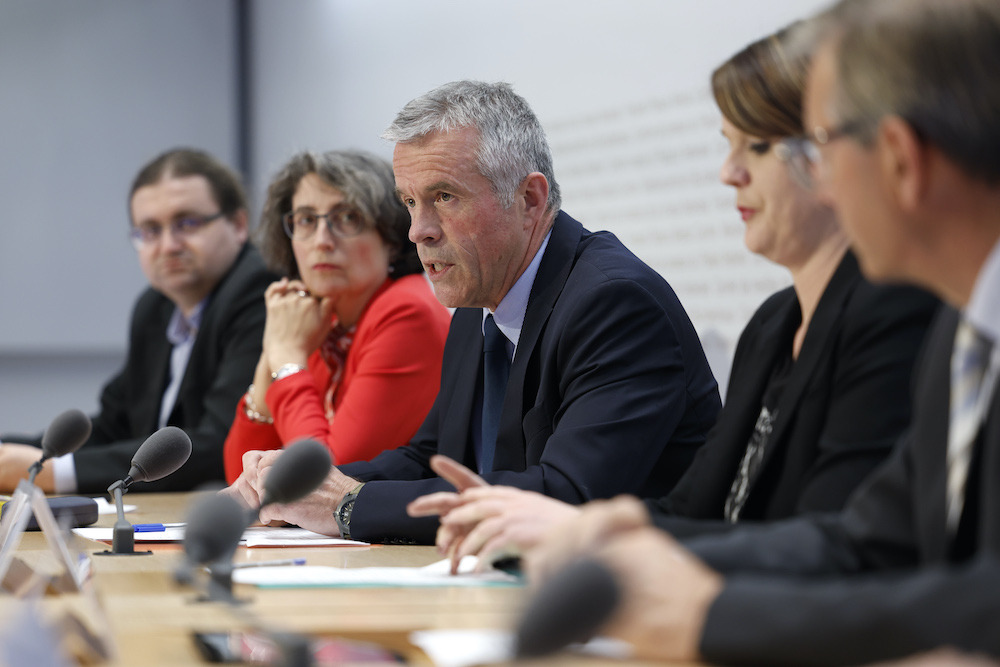Tue, May 23rd 2023

(Keystone SDA) Although Covid has largely disappeared from everyday life, it remains unpredictable, according to a committee of Swiss parliamentarians who are advocating that Swiss voters extend emergency Covid laws when they go to the polls next month.
Members of the Social Democratic Party (SP), the Green Party, the Green Liberal Party (GLP), the Freed Democratic Party (FDP), the Center Party, and the Evangelical People’s Party (EVP) are jointly campaigning for the extension of the Covid-19 Act under the argument that it protects those who are vulnerable. Voting will take place on June 18th.
“It’s better to be well prepared than badly surprised,” said Central National Councilor Lorenz Hess on Monday at a press conference in Bern. With the extension of the Covid law, action could be taken quickly if necessary, without applying emergency law. “The virus is still circulating heavily,” he said.
“It is our duty to protect people who are particularly at risk,” said Green National Councilor Manuela Weichelt.

“For people with a suppressed immune system the pandemic is not over yet,” said Weichelt. These people could be specifically protected with the extended regulations in the workplace, the use of medicines that have not yet been approved and the promotion of manufacturing such medicines, Weichelt added.
The provisions on medicines could be crucial for those who are particularly at risk, added National Councilor Sarah Wyss (SP). Since September 2020, several drugs have been made available.
Wyss assumes that there are currently around 70,000 long-Covid cases in Switzerland. For them, too, the extension of the relevant legal provision secures access to medicines, Wyss said.
Read more: How many Swiss died from the Covid vaccine?

The Federal Council and Parliament also want to secure the legal basis for restarting the controversial Covid Mobile Certificate and for issuing certificates for those who have been vaccinated, those who have recovered and those who have tested negative.
National Councilor Jörg Mäder (GLP) said it was highly unlikely that the certificate would again be used domestically. This is only conceivable if a new, dangerous virus variant poses an acute threat to health care, Mäder said.
“Fortunately, that’s not foreseeable at the moment,” he said.
In the opinion of the committee, the extension is also necessary to protect the economy against a renewed flare-up of the pandemic. The acute crisis management is followed by a transition phase in which increased vigilance and the ability to react quickly are required, said Uri FDP member Josef Dittli.

The Covid-19 law made it possible for around 400,000 cross-border commuters to commute to Switzerland despite the pandemic, including employees of homes and hospitals, Dittli said. This exception should still be possible, he added.
Marc Rüdisüli, President of the Young Centrist Party, addressed younger voters. For them, the measures against the corona virus were drastic, he said.
“I understand that this law triggers a queasy feeling,” he said. It is not about introducing measures, but about being prepared. As a young person, he sees himself as having a responsibility towards his parents, grandparents and society.
The supporters say that the last extension of the Covid-19 law is now up for debate. Dittli said that lessons from the pandemic would be incorporated into the revision of the Epidemics Act that the Federal Council is currently preparing.

Those against extending the Covid-19 regulations say the Mobile Covid Certificate is useless and discriminatory. The most popular political party in Switzerland, the SVP, opposes reinstating the restrictions.
While Covid-19 vaccines were never mandatory in Switzerland, they were heavily encouraged. Over the course of 2021, Switzerland launched a nationwide campaign persuading residents to get vaccinated. As part of that campaign, Switzerland created the Covid Mobile Certificate to distinguish between residents who had been vaccinated and those who had not.
Swiss restaurants, bars, cinemas, and other public places required patrons to first show proof they had been vaccinated before entering. Residents who chose not to be vaccinated said they felt ostracized and protested by the thousands against the certificate.
Should Swiss voters choose to vote down Parliament’s extension next month, all Covid measures will be dropped by mid-December of this year.
This article was reprinted with permission from Keystone-SDA.
